研究生英语阅读教程课后翻译答案
研究生英语阅读教程(提高级第三版)课后翻译答案(单独整理的)

1.就连乔·巴顿,对全球变暖持怀疑态度、来自得克萨斯州的共和党众议员,都谴责BP管理人员“对安全和环境问题表现得漠不关心”。
2.显然,考虑到清理费用和对BP 声誉的影响,高管们真希望可以回到过去,多花些钱让“深水地平线”更安全。
他们没有增加这笔费用就表明他们认为钻机在当时的状态下不会出问题。
3.埃克森公司瓦尔迪兹漏油事件发生后,在1990年的一个法案很少引人注意的一项条款中,美国国会将钻机泄漏清理费用的责任上限定为7500 万美元。
即使对旅游业、渔业等造成的经济损失高达数十亿美元,责任方也仅需要支付7500 万美元。
4.不过,如果认为我们目前仍然低估的只是那些突然间引人注目的风险,那是非常愚蠢的。
Lesson 21 It is a cliché, as it is to talk of apocalypse and nightm are, but when someth ing is beyond our experience, we reach for the points of refere nce we have. 说到世界末日和噩梦又是老生常谈,但是当事情超出我们的经验时,我们总会寻找现有的东西作为参照。
2 Lest you should ever forget the smalln ess of being human, the iconic Mount Fuji, instantly recognisable yet somehow differ ent on every viewin g, is an extinc t volcano. 唯恐你会忘记作为人类的渺小,标志性富士山,一眼即能认出但不知何故每次观看又呈现出不同景象,就是一座死火山。
研究生英语阅读教程(基础级)第三版课后习题答案lesson1.pdf
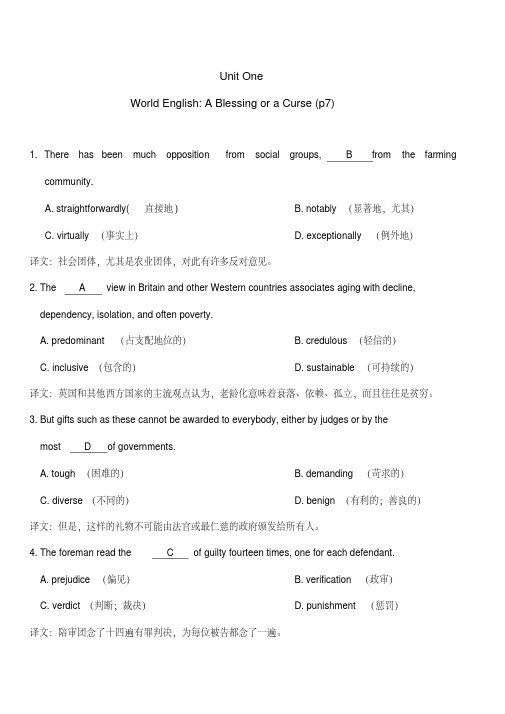
Unit OneWorld English: A Blessing or a Curse (p7)1. There has been much opposition from social groups, B from the farmingcommunity.A. straightforwardly(直接地)B. notably(显著地,尤其)C. virtually(事实上)D. exceptionally(例外地)译文:社会团体,尤其是农业团体,对此有许多反对意见。
2. The A view in Britain and other Western countries associates aging with decline,dependency, isolation, and often poverty.A. predominant(占支配地位的)B. credulous(轻信的)C. inclusive(包含的)D. sustainable(可持续的)译文:英国和其他西方国家的主流观点认为,老龄化意味着衰落、依赖、孤立,而且往往是贫穷。
3. But gifts such as these cannot be awarded to everybody, either by judges or by themost D of governments.A. tough(困难的)B. demanding(苛求的)C. diverse(不同的)D. benign(有利的;善良的)译文:但是,这样的礼物不可能由法官或最仁慈的政府颁发给所有人。
4. The foreman read the C of guilty fourteen times, one for each defendant.A. prejudice(偏见)B. verification(政审)C. verdict(判断;裁决)D. punishment(惩罚)译文:陪审团念了十四遍有罪判决,为每位被告都念了一遍。
研究生英语阅读教程(基础级第二版)1-10课文及课后习题答案翻译

研究生英语阅读教程(基础级第二版)1-10课文及课后习题答案翻译Lesson1II. VocabularyA. Choose the best word from the four choices to complete each of the following sentences.1. There has been much opposition from some social groups, ______ from the farming community.A. straightforwardlyB. notablyC. virtuallyD. exceptionally2. The ______ view in Britain and other Western countries associates aging with decline, dependency, isolation, and often poverty.A. predominantB. credulousC. inclusiveD. sustainable3. But gifts such as these cannot be awarded to everybody, either by judges or by the most ___ of governments./ reward rewardingA. toughB. demandingC. diverseD. benign4. The foreman read the ______ of guilty fourteen times, one for each defendant.A. prejudiceB. verificationC. verdictD. punishment5. They fear it could have a(n) ______ effect on global financial markets.A. sizeableB. adverse(negative)C. beneficialD. consequential6. The UN threatened to ______ economic sanctions if the talks were broken off.A. engageB. pursueC. abandon/ abundantD. invoke7. There are at least four crucial differences between the new ______ and the old government.A. regimeB. hegemonyC. complexD. federation/ fedal<->federal, confederate)8. These questions ______ a challenge to established attitude of superiority toward the outside world.A. evolveB. Constitute形成C. tolerateD. aroused9. Because of this, a strong administrative ______ was needed to plan the use of scarce resources, organize production and regulate distribution.A. apparatusB. constitutionC. insistenceD. promotion10. I learnt that there are no genuinely ______ animals in this area, all the animals were brought here from other places.A. endangeredB. domesticatedC. indigenousD. extinctB. Choose the hest word or expression from the list given for each Honk Use each word or expression only once and make proper changes where necessary.point up by and large take in descent for good or illleave aside crystal clear die out endanger lay... at the door of1. The book concludes with a review of the possible impact (influence) of more intimate computers for good or ill, in various areas of human life.2. Moreover, it had become clear from the opinion polls that the unpopularity of the new tax was being laid at the door of the government which had introduced it, rather than the local authorities who were responsible for levying and collecting it.3. This case gave the example of breaking someone's arm: that is a really serious injury, but one which is unlikely to endanger the victim's life.4. Many of those who hold it live in poor areas and some are Colored, that is (i.e./ namely), of mixed European and African descent.5. This debate is important because it points up (stress/ emphasize) that "the facts" are not necessarily assimple and straightforward as they might at first sight seem.6. In the beginning, the meaning of life might be debated, but once past the first period, many of the conversations follow a well-worn route from one topic to the next and back again, taking in most of human life.7. But since agriculture forms the basis (base) of our industry, it was, by and large (on the whole), also an intensification of the crisis in the national economy in general.8. Let us leave aside other relevant factors such as education, career structure, pay and conditions of service and concentrate on (focus on) manpower management.(relate A to B)9. It is true that the exact nature of this issue is uncertain. However, one thing is crystal clear: it will not endanger the planet and its inhabitants.10. But if animal populations are too small, then they simply die out.III. ClozeThere are ten blanks in the following passage. Read the passage carefully and choose the best answer from the four choices given for each blank. [criteria: (1)semantic/ (2)grammatic]A simplified form of the English language based on 850 key words was developed in the late 1920s by the English psychologist Charles Kay Ogden and 1 by the English educator I.A. Richards. Known as Basic English, it was used mainly to teach English to non-English-speaking persons and 2 as an international language. The complexities of English spelling and grammar, however, were major 3 to the adoption of Basic English as a second language.The fundamental principle of Basic English was that any idea, 4 complex, may be reduced to simple units of thought andexpressed clearly by a limited number of everyday words. The 850-word primary vocabulary was 5 600 nouns (representing things or events), 150 adjectives (for qualities and _ 6 ), and 100 general "operational" words, mainly verbs and prepositions. Almost all the words were in 7 use in English-speaking countries. More than 60 percent of them were one-syllable words. The basic vocabulary was created 8 by eliminating 9 the use of 18 "basic" verbs, such as make, get, do, have, and be.Numerous words which have the same or similar meanings and by verbs, such as make, get, do, have, and be. These verbs were generally combined with prepositions, such as up, among, under, in, and forward. For example,a Basic English student would use the expression “go up”10 "ascend". (Semantic / grammatical criterion)1. A. created B. publicized C. invented D. operated2. A. proved B. provided C. projected D. promoted3. A. advantages B. objections C. obstacles D. facileties4. A. however B. whatever C. wherever D. whenever5. A. comprised of B. made of C. composed of D. constituted of6. A. personalities B. properties C. preferences D. perceptions/ perceive)7. A. common B. ordinary C. average D. nonprofessional8. A. in all B. at times C. for good D. in part/ partially)9. A. experiencing B. exchanging C. excluding D. extending10. A. in spite of =despite B. in favor of C. instead of D. in case ofII. TranslationPut the following passages into Chinese.1. For English is a killer. It is English that has killed off Cumbric,Cornish, Norn and Manx. There are still parts of these islands where sizeable communities speak languages that were there before English. Yet English is everywhere in everyday use and understood by all or virtually all, constituting such a threat to the three remainingCeltic languages, Irish, Scottish Gaelic, and Welsh... that their long-term future must be considered... very greatly at risk.因为英语是个杀手。
研究生英语阅读教程(提高级)课后习题翻译(带原文、最全版)
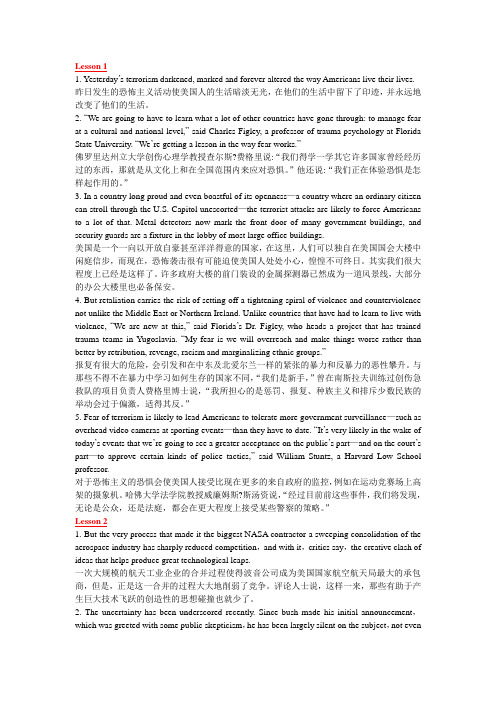
Lesson 11. Yesterday’s terrorism darkened, marked and forever altered the way Americans live their lives. 昨日发生的恐怖主义活动使美国人的生活暗淡无光,在他们的生活中留下了印迹,并永远地改变了他们的生活。
2. “We are going to have to learn what a lot of other countries have gone through: to manage fear at a cultural and national level,” said Charles Figley, a professor of trauma psychology at Florida State University. “We’re getting a lesson in the way fear works.”佛罗里达州立大学创伤心理学教授查尔斯?费格里说:“我们得学一学其它许多国家曾经经历过的东西,那就是从文化上和在全国范围内来应对恐惧。
”他还说:“我们正在体验恐惧是怎样起作用的。
”3. In a country long proud and even boastful of its openness—a country where an ordinary citizen can stroll through the U.S. Capitol unescorted—the terrorist attacks are likely to force Americans to a lot of that. Metal detectors now mark the front door of many government buildings, and security guards are a fixture in the lobby of most large office buildings.美国是一个一向以开放自豪甚至洋洋得意的国家,在这里,人们可以独自在美国国会大楼中闲庭信步,而现在,恐怖袭击很有可能迫使美国人处处小心,惶惶不可终日。
研究生英语阅读教程(提高级 第三版)课后翻译答案(单独整理的)
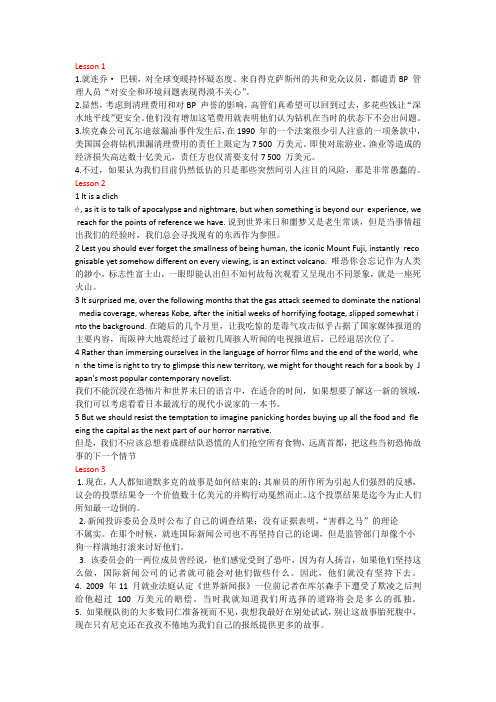
Lesson 11.就连乔·巴顿,对全球变暖持怀疑态度、来自得克萨斯州的共和党众议员,都谴责BP 管理人员“对安全和环境问题表现得漠不关心”。
2.显然,考虑到清理费用和对BP 声誉的影响,高管们真希望可以回到过去,多花些钱让“深水地平线”更安全。
他们没有增加这笔费用就表明他们认为钻机在当时的状态下不会出问题。
3.埃克森公司瓦尔迪兹漏油事件发生后,在1990 年的一个法案很少引人注意的一项条款中,美国国会将钻机泄漏清理费用的责任上限定为7 500 万美元。
即使对旅游业、渔业等造成的经济损失高达数十亿美元,责任方也仅需要支付7 500 万美元。
4.不过,如果认为我们目前仍然低估的只是那些突然间引人注目的风险,那是非常愚蠢的。
Lesson21It is a cliché,as it is to talk of apocalypse and nightmare,but when something is beyond our experience,we reach for the points of reference we have.说到世界末日和噩梦又是老生常谈,但是当事情超出我们的经验时,我们总会寻找现有的东西作为参照。
2Lest you should ever forget the smallness of being human,the iconic Mount Fuji,instantly reco gnisable yet somehow different on every viewing,is an extinct volcano.唯恐你会忘记作为人类的渺小,标志性富士山,一眼即能认出但不知何故每次观看又呈现出不同景象,就是一座死火山。
3It surprised me,over the following months that the gas attack seemed to dominate the national media coverage,whereas Kobe,after the initial weeks of horrifying footage,slipped somewhat i nto the background.在随后的几个月里,让我吃惊的是毒气攻击似乎占据了国家媒体报道的主要内容,而阪神大地震经过了最初几周骇人听闻的电视报道后,已经退居次位了。
研究生英语阅读教程(基础级3版)课文答案翻译 经典

Lesson 1II. TranslationPut the following passages into Chinese.1. For English is a killer. It is English that has killed off Cumbric, Cornish, Norn and Manx. There are still parts of these islands where sizeable communities speak languages that were there before English. Yet English is everywhere in everyday use and understood by all or virtually all, constituting such a threat to the three remaining Celtic languages, Irish, Scottish Gaelic, and Welsh... that their long-term future must be considered... very greatly at risk.因为英语是个杀手。
正是英语造成了康瑞克、康尼施、诺恩、曼科斯等语言的消亡。
在其中一部分岛上还有相当多的人使用在英语到来之前就已存在的语言。
然而,英语在日常生活中无处不在。
所有的人或几乎所有的人都懂英语。
英语对现存的凯尔特语——爱尔兰语、苏格兰盖尔语及威尔士语的威胁是如此之大,它们的未来岌岌可危。
2. He also associated such policies with a prejudice which he calls linguisticism (a condition parallel to racism and sexism). As Phillipson sees it, leading institutions and individuals within the predominantly "white" English-speaking world, have (by design or default) encouraged or at least tolerated—and certainly have not opposed—the hegemonic spread of English, a spread which began some three centuries ago as economic and colonial expansion.同时,他认为这些政策和他称之为语言歧视(和种族歧视、性别歧视的情况类似)的偏见密切相关。
研究生英语阅读教程(基础级第二版)1-10课文及课后习题答案翻译

Lesson1READING SELECTION AWorld English: A Blessing or a Curse? Universal languageBy Tom McArthur[1] In the year 2000, the language scholar Glanville Price, a Welshman, made the following assertion as editor of the book Languages in Britain and Ireland:For English is a killer. It is English that has killed off Cumbric, Cornish, Norn and Manx. There are still parts of these islands where sizeable communities speak languages that were there before English. Yet English is everywhere in everyday use and understood by all or virtually all, constituting such a threat to the three remaining Celtic languages, Irish, Scottish Gaelic, and Welsh... that their long-term future must be considered... very greatly at risk. (p 141)Some years earlier, in 1992, Robert Phillipson, English academic who currently works in Denmark, published with Oxford a book entitled Linguistic Imperialism. In it, he argued that the major English-speaking countries, the worldwide English-language teaching industry, and notably the British Council pursue policies of linguistic aggrandisement. He also associated such policies with a prejudice which he calls linguicism (a condition parallel to(equal to/ similar to) racism and sexism). As Phillipson sees it, leading institutions and individuals within the predominantly "white" English-speaking world, have [by design(=deliberate) or default(=mistake)] encouraged or at least tolerated—and certainly have not opposed—the hegemonic spread of English, a spread which began some three centuries ago as economic and colonial expansion.[2] Phillipson himself worked for some years for the British Council, and he is not alone among Anglophone academics who have sought to point up the dangers of English as a world language. The internationalization of English has in the last few decades been widely discussed in terms of three groups: first, the ENL countries, where English is a native language (this group also being known as the "inner circle"); second, the ESL countries, where English is a second language (the "outer circle"); and third, the EFL countries, where English is a foreign language (the "expanding circle"). Since the 1980s, when such terms became common, this third circle has in fact expanded to take in the entire planet.[3] For good or for ill, there has never been a language quite like English. There have been many "world languages", such as Arabic, Chinese, Greek, Latin, and Sanskrit. By and large, we now view them as more or less benign, and often talk with admiration and appreciation about the cultures associated with them and what they have given to the world. And it is fairly safe to do this, because none of them now poses much of a threat.[4] English however is probably too close for us to be able to analyze and judge it as dispassionately, as we may now discuss the influence of Classical Chinese on East Asia or of Classical Latin on Western Europe. The jury is still out in the trial of the English language, and may take several centuries to produce its verdict, but even so we can ask, in this European Year of Languages, whether Price and Phillipson are right to warn us all about the language that I am using at this very moment.[5] It certainly isn't hard to look for situations where people might call English a curse. An example is Australia, which is routinely regarded as a straightforward English-speaking country. The first Europeans who went there often used Latin to describe and discuss the place. The word Australia itself is Latin; evidently no one at the time thought of simply calling it "Southland" (which is what Australia means). In addition, in South Australia there is a wide stretch of land called the Nullarbor Plains, the first word of which sounds Aboriginal, but nullarbor is Latin and means "no trees". And most significantly of all, the early settlers called the continent a terra nullius. According to the Encarta World English Dictionary (1999) the Latin phrase terra nullius means:... the idea and legal concept that when the first Europeans arrived in Australia the land was owned by no one and therefore open to settlement. It has been judged not to be legally valid.But that judgment was made only recently. When the Europeans arrived, Australia was thinly populated—but populated nonetheless—from coast to coast in every direction. There were hundreds of communities and languages. Many of these languages have died out, many more are in the process of dying out, and these dead and dying languages have been largely replaced by either kinds of pidgin English or general Australian English. Depending on your point of view, this is either a tragic loss or the price of progress.[6] At the same time, however, can the blame for the extinction of Aboriginal languages be laid specifically at the door of English? The first Europeans to discover Australia were Dutch, and their language might have become the language of colonization and settlement. Any settler language could have had the same effect. If for example the Mongols had sustained their vast Eurasian empire, Mongolian might have become a world language and gone to Australia. Again, if history had been somewhat different, today's world language might have been Arabic, a powerful language in West Asia and North Africa that currently affects many smaller languages, including Coptic and Berber. Spanish has adversely affected indigenous languages in so-called "Latin" America, and Russian has spread from Europe to the Siberian Pacific. If English is a curse and a killer, it may only be so in the sense that any large language is likely to influence and endanger smaller languages.[7] Yet many people see English as a blessing. Let me leave aside here the obvious advantages possessed by any world language, such as a large communicative network, a strong literary and media complex, and a powerful cultural and educational apparatus. Let us instead look at something rather different: the issue of politics, justice, and equality. My object lesson this time is South Africa. Ten years ago, South Africa ceased to be governed on principles of racial separateness, a system known in Afrikaans (a language derived from Dutch) as apartheid. The system arose because the Afrikaner community—European settlers of mainly Dutch descent—saw themselves as superior to the indigenous people of the land they had colonized.[8] English-speaking South Africans of British descent were not particularly strong in opposing the apartheid regime, and the black opposition, whose members had many languages, was at first weak and disorganized. However, the language through which this opposition gained strength and organization was English, which became for them the key language of freedom and unity, not of oppression. There are today eleven official languages in South Africa—English, Afrikaans, and nine vernacular languages that include Zulu, Ndebele, and Setswana. But which of these nine do black South Africans use (or plan to use) as their national lingua franca? Which do they wish their children to speak and write successfully (in addition to their mother tongues)? The answer is none of the above. They want English, and in particular they want a suitably Africanized English.[9] So, a curse for the indigenous peoples of Australia and something of a blessing for those in South Africa...[10] How then should we think of English in our globalizing world with its endangered diversities? The answer, it seems to me, is crystal clear. Like many things, English is at times a blessing and at times a curse—for individuals, for communities, for nations, and even for unions of nations. The East Asian symbolism of yin and yang might serve well here: There is something of yang in every yin, of yin in every yang. Although they are opposites, they belong together: in this instance within the circle of communication. Such symbolism suggests that the users of the world's lingua franca should seek to benefit as fully as possible from the blessing and as far as possible avoid invoking the curse. (1, 292 words)ABOUT THE AUTHORDr. Tom McArthur is founder editor of the Oxford Companion to the English Language(1992) and the quarterly English Today: The International Review of the English Language (Cambridge, 1985— ). His more than 20 published works include the Longman Lexicon of Contemporary English(1981), Worlds of Reference: Language, Lexicography and Learning from the Clay Tablet to the Computer (1986), and The English Languages (1998). He is currently Deputy Director of the Dictionary Research Center at the University of Exeter.EXERCISESI. Reading ComprehensionAnswer the following questions or complete the, following statements.1. It can be inferred from Glanville Price's statement that he is ______.A. happy that English is everywhere in Britain and IrelandB. worried about the future of the remaining Celtic languagesC. shocked by the diversity of languages in Britain and IrelandD. amazed that many people in the UK still speak their Aboriginal languages2. Cumbric is used as an example of ______.A. a local dialectB. a victim of the English languageC. a language that is on the verge of extinctionD. a language that is used by only a limited number of people3. Which of the following is the major concern of the book Linguistic Imperialism?A. English teaching overseas.B. British government's language policies.C. Dominance of English over other languages.D. The role of English in technology advancement.4. Both Price and Phillipson are ______.A. government officialsB. advocates of linguistic imperialismC. in support of language policies carried out by the British CouncilD. concerned about the negative effect of English on smaller languages5. According to the text, the EFL countries ______.A. are large in numberB. is known as the "outer circle"C. will be endangered by EnglishD. have made English their official language6. According to McArthur, Chinese is different from English in that ______.A. it has made a great contribution to the worldB. it has had positive influence on other languagesC. it may result in the disappearance of other languagesD. it probably will not endanger the existence of other languages7. When he said the jury is out in the trial" (Line 3, Paragraph 4), McArthur meant ______.A. punishment is dueB. the jury is waiting for a trialC. no decision has been made yetD. there is no one to make the decision8. Australia might be used as an example to show that ______.A. languages are changing all the timeB. some English words are derived from LatinC. English has promoted the progress of some nationsD. English should be blamed for the extinction of smaller languages9. Many people see English as a blessing for people in ______.A. AustraliaB. East AsiaC. South AfricaD. ESL countries10. The main theme of this speech is that ______.A. English should be taught worldwideB. English as a world language does more harm than goodC. we should be objective to the internationalization of EnglishD. we should be aware of (realize) the danger of English as a world languageB. Questions on global understanding and logical structures1. Why does McArthur introduce Glanville Price and Robert Phillipson's points of view on the spread of English? What is his? Intention?McArthur quotes Price’s assertion and cites Pillipson’s viewpoint on the spread of English as sort of cons to initiate his argument. Cons are usually popularly believed arguments or opinions that are against the author’s point of view. Cons are commonly used writing techniques and are often employed in order to appeal the audience and highlight the author’sviewpoint.2. Does McArthur agree with what Price and Phillipson argued? From as early as which section does McArthur show his attitude? Toward the dominance of English as a world English?No. McArthur’s opinion is different from Price and Pillipson’s arguments. He doesn’t believe that English is a killer and should be blamed for the extinction of smaller languages. He sees English as both a blessing and a curse, maybe as a blessing more than a curse. After introducing Price and Pillipson’s viewpoints, McArthur writes about his own ideas on the iss ue of English as a world language. From the sentence “For good or for ill, there has never been a language quite like English”, we can learn that McArthur does not curse English like Price and Pillipson and he has a different point of view.3. By reading "It certainly isn't hard to look for situations where people might call English a curse", could we conclude that McArthur believes English is a curse?No. This sentence is a kind of justification. Although McArthur literally justifies the fact that there are situations where people might call English a curse, he doesn’t believe that English is virtually a curse. By adding the word “certainly” McArthur shows his intent.4. Could you pick up some words and expressions that signal change or continuation in McArthur's thought?“For good or for ill”(paragraph 3) /“however” (paragraph 4) /“But”(paragraph 5) / “At the same time,however”(paragraph 6) /“Yet”(paragraph 7)5. How many parts can this speech be divided? How are the parts organized?Part One: paragraphs 1 and 2. These two paragraphs introduce the situation that many academics argue against English as a world language.Part Two: paragraphs 3, 4, 5, 6, 7, 8, and 9. Paragraph three is a transitional paragraph that initiates McArthur’s own argument. In these paragraphs McArthur argues that English is not only a curse as many people have believed, but a blessing as well.Part Three: paragraph 10. McArthur concludes in the last paragraph that English may be a curse or a blessing depends on different situations and we should make advantages of world languages and avoid their disadvantages.II. VocabularyA. Choose the best word from the four choices to complete each of the following sentences.1. There has been much opposition from some social groups, ______ from the farming community.A. straightforwardlyB. notablyC. virtuallyD. exceptionally2. The ______ view in Britain and other Western countries associates aging with decline, dependency, isolation, and often poverty.A. predominantB. credulousC. inclusiveD. sustainable3. But gifts such as these cannot be awarded to everybody, either by judges or by the most ___ of governments./ reward rewardingA. toughB. demandingC. diverseD. benign4. The foreman read the ______ of guilty fourteen times, one for each defendant.A. prejudiceB. verificationC. verdictD. punishment5. They fear it could have a(n) ______ effect on global financial markets.A. sizeableB. adverse(negative)C. beneficialD. consequential6. The UN threatened to ______ economic sanctions if the talks were broken off.A. engageB. pursueC. abandon/ abundantD. invoke7. There are at least four crucial differences between the new ______ and the old government.A. regimeB. hegemonyC. complexD. federation/ fedal<->federal, confederate)8. These questions ______ a challenge to established attitude of superiority toward the outside world.A. evolveB. constituteC. tolerateD. aroused9. Because of this, a strong administrative ______ was needed to plan the use of scarce resources, organize production and regulate distribution.A. apparatusB. constitutionC. insistenceD. promotion10. I learnt that there are no genuinely ______ animals in this area, all the animals were brought here from other places.A. endangeredB. domesticatedC. indigenousD. extinctB. Choose the hest word or expression from the list given for each Honk Use each word or expression only once and make proper changes where necessary.point up by and large take in descent for good or illleave aside crystal clear die out endanger lay... at the door of1. The book concludes with a review of the possible impact (influence) of more intimate computers for good or ill, in various areas of human life.2. Moreover, it had become clear from the opinion polls that the unpopularity of the new tax was being laid at the door of the government which had introduced it, rather than the local authorities who were responsible for levying and collecting it.3. This case gave the example of breaking someone's arm: that is a really serious injury, but one which is unlikely to endanger the victim's life.4. Many of those who hold it live in poor areas and some are Colored, that is (i.e./ namely), of mixed European and African descent.5. This debate is important because it points up (stress/ emphasize) that "the facts" are not necessarily as simple and straightforward as they might at first sight seem.6. In the beginning, the meaning of life might be debated, but once past the first period, many of the conversations follow a well-worn route from one topic to the next and back again, taking in most of human life.7. But since agriculture forms the basis (base) of our industry, it was, by and large (on the whole), also an intensification of the crisis in the national economy in general.8. Let us leave aside other relevant factors such as education, career structure, pay and conditions of service and concentrate on (focus on) manpower management.(relate A to B)9. It is true that the exact nature of this issue is uncertain. However, one thing is crystal clear: it will not endanger the planet and its inhabitants.10. But if animal populations are too small, then they simply die out.III. ClozeThere are ten blanks in the following passage. Read the passage carefully and choose the best answer from the four choices given for each blank. [criteria: (1)semantic/ (2)grammatic]A simplified form of the English language based on 850 key words was developed in the late 1920s by the English psychologist Charles Kay Ogden and 1 by the English educator I. A. Richards. Known as Basic English, it was used mainly to teach English to non-English-speaking persons and 2 as an international language. The complexities of English spelling and grammar, however, were major 3 to the adoption of Basic English as a second language.The fundamental principle of Basic English was that any idea, 4 complex, may be reduced to simple units of thought and expressed clearly by a limited number of everyday words. The 850-word primary vocabulary was 5 600 nouns (representing things or events), 150 adjectives (for qualities and _ 6 ), and 100 general "operational" words, mainly verbs and prepositions. Almost all the words were in 7 use in English-speaking countries. More than 60 percent of them were one-syllable words. The basic vocabulary was created 8 by eliminating 9 the use of 18 "basic" verbs, such as make, get, do, have, and be.Numerous words which have the same or similar meanings and by verbs, such as make, get, do, have, and be. These verbs were generally combined with prepositions, such as up, among, under, in, and forward. For example,a Basic English student would use the expression “go up”10 "ascend". (Semantic / grammatical criterion)1. A. created B. publicized C. invented D. operated2. A. proved B. provided C. projected D. promoted3. A. advantages B. objections C. obstacles D. facileties4. A. however B. whatever C. wherever D. whenever5. A. comprised of B. made of C. composed of D. constituted of6. A. personalities B. properties C. preferences D. perceptions/ perceive)7. A. common B. ordinary C. average D. nonprofessional8. A. in all B. at times C. for good D. in part/ partially)9. A. experiencing B. exchanging C. excluding D. extending10. A. in spite of =despite B. in favor of C. instead of D. in case ofII. TranslationPut the following passages into Chinese.1. For English is a killer. It is English that has killed off Cumbric, Cornish, Norn and Manx. There are still parts of these islands where sizeable communities speak languages that were there before English. Yet English is everywhere in everyday use and understood by all or virtually all, constituting such a threat to the three remaining Celtic languages, Irish, Scottish Gaelic, and Welsh... that their long-term future must be considered... very greatly at risk.因为英语是个杀手。
研究生英语阅读教程(课后翻译部分答案)

LESSON 11.因为英语是个杀手,正是英语造成了坎伯兰语,康沃尔语,诺恩语和马恩语等语言的消亡.在这些岛上还有相当多的人使用在英语到来之前就已存在的语言.然而,英语在日常生活中无处不在.所有的人或几乎所有的人都懂英语.英语对现存的凯尔特语:爱尔兰语、苏格兰盖尔语及威尔士语的威胁是如此之大,它们的未来岌岌可危。
2.同时,他认为这些政策和他称之为语言歧视(和种族歧、,性别歧视的情况类似")的偏见密切相关。
在菲利普森看来,在以白人英语为主导的世界,最重要的机构和个人(有意或无意地)鼓励或者至少是容忍了(肯定没有反对)英语霸权主义式的传播。
这种传播始于三个世纪之前的经济及殖民扩张。
3.总的来说,我们现在或多或少地把这些语言看作有利的语言。
在谈到与之相关的文化及其为世界所做的贡献时,我们常怀有崇敬与赞赏,而且这样做也没有太大的风险,因为这些语言现在已不会构成什么威胁。
4.然而,许多人把英语看成是一件幸事。
在此,我暂且不谈任何世界语言所具有的明显优势,例如广泛的通信网,强大的文化传媒体系,及强有力的文化教育机构。
5.讲英语的南非英国后裔并不强烈反对种族隔离政权,而黑人反对力量,其成员讲多种语言,在初期软弱无力且缺乏组织。
6.这一象征表明这种世界通用语的使用者应充分发掘这一幸事为我们带来的好处,同时尽可能避免招来灾难。
LESSON 21.年初布什总统签署了一项《不让一个孩子落后》的重大法案,誓言要把“困在那些教学质量不佳又不进行改革的学校里的孩子”解救出来.2007 年7月1日美国教育部宣布有8652所学校被列为“长期教学质量低下”的学校,现在这些学校中的学生必须在今后的几天内考虑决定他们是否要转学, 同时各个学区也在忙着为符合转学条件的学生提供帮助和服务以抓住选择的机会。
2.对于那些在教学改革旋涡中挣扎的学校的校长、老师和学生来说,这一法案的直接后果则是迷惑与混乱。
他们认为该法案制订的教学改革标准太高而又没有说明各学区如何达到这些标准。
研究生英语阅读教程(上)徐智英骆洪主编课文翻译和课后答案.doc

Unit 3Economicsdeficit n.■[英JfdefisitlJ 美『血fisitLthe difference between the amount of something that you have and the higher amount that you need 赤字■shortfallin deficit■美国的国际收支平衡出现逆差。
■The US balance of payments was in deficiton course to do sth■likely to do sth■我们看可能打进锦标赛。
■We are on course to qualify for the championship.no end in sight■unlikely to end soon■罢工开给至今已六个月了,眼下还看不到结束的迹象。
■Six months from the start of the strike there is still no end in sight finance v.■to provide money to pay for sth 为…提供资金■fund v.■inflation n.■ a continuing increase in prices 物价上涨,通货膨胀■deflation通过紧缩■depreciation (line 3, para. 1)■[英Jldijprij/ifei/enlJ 美][di’priJTe/onL■decrease in the value of a currency relative to other currencies (货币)贬值■外汇贬值是有关国家经济不景气的结果。
■Foreign currency depreciation is a result of economic depression in the country concerned.■knowledgeable adj.■learned■well-informedunsustainable adj.■unable to continue 难以维持的sustain v.■to make sth continue■maintain■她发现很难维持孩子们的兴趣。
研究生英语阅读教程上册UNIT1-6课后答案及翻译刘朝武主编

研究生英语阅读教程上册UNIT1-6课后答案及翻译刘朝武主编《21世纪研究生英语教材》阅读教程UNIT1-6课后答案及课文翻译(上册)UNIT ONEThe Belly BurdenAmanda Spake? Key to ExercisesI. Reading Comprehensioni 1. B 2. C 3. C 4. D 5. C 6. D 7. C 8. B 9. B 10. A ii (略)II Vocabulary and Structurei 1.Obesity 2.circulate 3.abdominal 4.break down5.mortality6.variable7.resistance8.modified9.critically 10. inert ii 1. internist 2.supplant. 3. willowy (twiggy) 4.slow down 5.set off 6. nonchalantly 7.accumulate 8. unravel 9.culprit10. affirm III Cloze1. D2. A3. B4. A5. B6. D7. C8. A9. D 10. C11. B 12. B 13. A 14. A 15. D 16. C 17. B 18. A 19. A 20. C IV Translation i1. 几个世纪以来,妇女们始终相信一条朴实的真理:腰越细,生活就越好―医学研究者们如今正开始了解这一简单真理背后的生理机能。
12. 与腹部脂肪是位于腰部无所事事的惰性软组织这一观念相反,腹部脂肪实际上是一些小的内分泌工厂,会制造一些把信息传送给许多器官的激素。
3. 医学解开代谢之谜是脂肪的难题尚需数十年。
医生们说,在此期间采取的主要行动是制止腰部变粗。
萨瓦德说:“我们每个人都需要放慢让自己体形变得更像苹果的过程。
(完整版)研究生英语阅读教程(基础级)第三版课后习题答案Lesson1246812

Lesson 1 World English: A Blessing or a Curse (p7)1. There has been much opposition from social groups, B from the farmingcommunity.A. straightforwardly(直接地)B. notably(显著地,尤其)C. virtually(事实上)D. exceptionally(例外地)译文:社会团体,尤其是农业团体,对此有许多反对意见。
2. The A view in Britain and other Western countries associates aging with decline, dependency, isolation, and often poverty.A. predominant(占支配地位的)B. credulous(轻信的)C. inclusive(包含的)D. sustainable(可持续的)译文:英国和其他西方国家的主流观点认为,老龄化意味着衰落、依赖、孤立,而且往往是贫穷。
3. But gifts such as these cannot be awarded to everybody, either by judges or by the most D of governments.A. tough(困难的)B. demanding(苛求的)C. diverse(不同的)D. benign(有利的;善良的)译文:但是,这样的礼物不可能由法官或最仁慈的政府颁发给所有人。
4. The foreman read the C of guilty fourteen times, one for each defendant.A. prejudice(偏见)B. verification(政审)C. verdict(判断;裁决)D. punishment(惩罚)译文:陪审团念了十四遍有罪判决,为每位被告都念了一遍。
研究生英语阅读教程(基础级3版)课文答案翻译
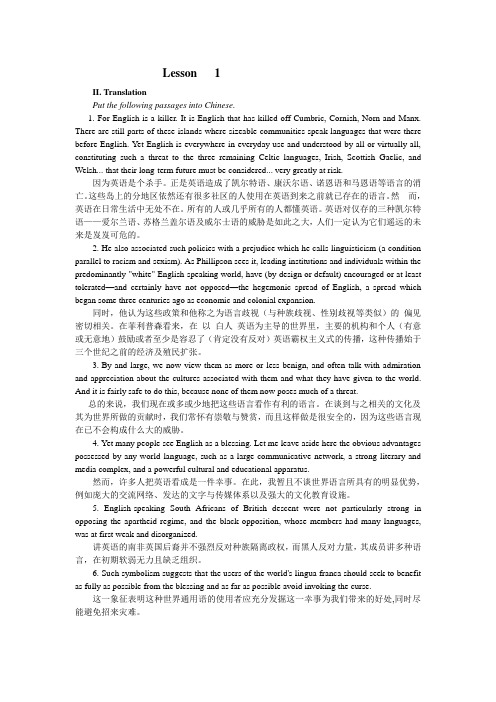
Lesson 1II. TranslationPut the following passages into Chinese.1. For English is a killer. It is English that has killed off Cumbric, Cornish, Norn and Manx. There are still parts of these islands where sizeable communities speak languages that were there before English. Yet English is everywhere in everyday use and understood by all or virtually all, constituting such a threat to the three remaining Celtic languages, Irish, Scottish Gaelic, and Welsh... that their long-term future must be considered... very greatly at risk.因为英语是个杀手。
正是英语造成了凯尔特语、康沃尔语、诺恩语和马恩语等语言的消亡。
这些岛上的分地区依然还有很多社区的人使用在英语到来之前就已存在的语言。
然而,英语在日常生活中无处不在。
所有的人或几乎所有的人都懂英语。
英语对仅存的三种凯尔特语——爱尔兰语、苏格兰盖尔语及威尔士语的威胁是如此之大,人们一定认为它们遥远的未来是岌岌可危的。
2. He also associated such policies with a prejudice which he calls linguisticism (a condition parallel to racism and sexism). As Phillipson sees it, leading institutions and individuals within the predominantly "white" English-speaking world, have (by design or default) encouraged or at least tolerated—and certainly have not opposed—the hegemonic spread of English, a spread which began some three centuries ago as economic and colonial expansion.同时,他认为这些政策和他称之为语言歧视(与种族歧视、性别歧视等类似)的偏见密切相关。
研究生英语阅读教程(基础级第二版)1-10课文及课后习题答案翻译
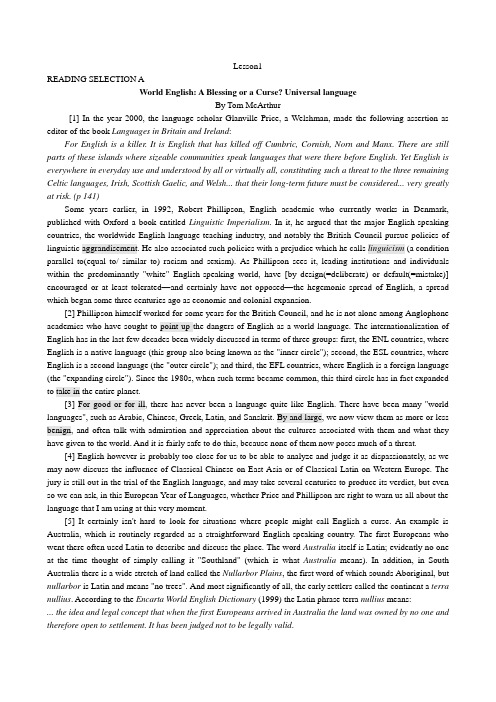
Lesson1READING SELECTION AWorld English: A Blessing or a Curse? Universal languageBy Tom McArthur[1] In the year 2000, the language scholar Glanville Price, a Welshman, made the following assertion as editor of the book Languages in Britain and Ireland:For English is a killer. It is English that has killed off Cumbric, Cornish, Norn and Manx. There are still parts of these islands where sizeable communities speak languages that were there before English. Yet English is everywhere in everyday use and understood by all or virtually all, constituting such a threat to the three remaining Celtic languages, Irish, Scottish Gaelic, and Welsh... that their long-term future must be considered... very greatly at risk. (p 141)Some years earlier, in 1992, Robert Phillipson, English academic who currently works in Denmark, published with Oxford a book entitled Linguistic Imperialism. In it, he argued that the major English-speaking countries, the worldwide English-language teaching industry, and notably the British Council pursue policies of linguistic aggrandisement. He also associated such policies with a prejudice which he calls linguicism (a condition parallel to(equal to/ similar to) racism and sexism). As Phillipson sees it, leading institutions and individuals within the predominantly "white" English-speaking world, have [by design(=deliberate) or default(=mistake)] encouraged or at least tolerated—and certainly have not opposed—the hegemonic spread of English, a spread which began some three centuries ago as economic and colonial expansion.[2] Phillipson himself worked for some years for the British Council, and he is not alone among Anglophone academics who have sought to point up the dangers of English as a world language. The internationalization of English has in the last few decades been widely discussed in terms of three groups: first, the ENL countries, where English is a native language (this group also being known as the "inner circle"); second, the ESL countries, where English is a second language (the "outer circle"); and third, the EFL countries, where English is a foreign language (the "expanding circle"). Since the 1980s, when such terms became common, this third circle has in fact expanded to take in the entire planet.[3] For good or for ill, there has never been a language quite like English. There have been many "world languages", such as Arabic, Chinese, Greek, Latin, and Sanskrit. By and large, we now view them as more or less benign, and often talk with admiration and appreciation about the cultures associated with them and what they have given to the world. And it is fairly safe to do this, because none of them now poses much of a threat.[4] English however is probably too close for us to be able to analyze and judge it as dispassionately, as we may now discuss the influence of Classical Chinese on East Asia or of Classical Latin on Western Europe. The jury is still out in the trial of the English language, and may take several centuries to produce its verdict, but even so we can ask, in this European Year of Languages, whether Price and Phillipson are right to warn us all about the language that I am using at this very moment.[5] It certainly isn't hard to look for situations where people might call English a curse. An example is Australia, which is routinely regarded as a straightforward English-speaking country. The first Europeans who went there often used Latin to describe and discuss the place. The word Australia itself is Latin; evidently no one at the time thought of simply calling it "Southland" (which is what Australia means). In addition, in South Australia there is a wide stretch of land called the Nullarbor Plains, the first word of which sounds Aboriginal, but nullarbor is Latin and means "no trees". And most significantly of all, the early settlers called the continent a terra nullius. According to the Encarta World English Dictionary (1999) the Latin phrase terra nullius means:... the idea and legal concept that when the first Europeans arrived in Australia the land was owned by no one and therefore open to settlement. It has been judged not to be legally valid.But that judgment was made only recently. When the Europeans arrived, Australia was thinly populated—but populated nonetheless—from coast to coast in every direction. There were hundreds of communities and languages. Many of these languages have died out, many more are in the process of dying out, and these dead and dying languages have been largely replaced by either kinds of pidgin English or general Australian English. Depending on your point of view, this is either a tragic loss or the price of progress.[6] At the same time, however, can the blame for the extinction of Aboriginal languages be laid specifically at the door of English? The first Europeans to discover Australia were Dutch, and their language might have become the language of colonization and settlement. Any settler language could have had the same effect. If for example the Mongols had sustained their vast Eurasian empire, Mongolian might have become a world language and gone to Australia. Again, if history had been somewhat different, today's world language might have been Arabic, a powerful language in West Asia and North Africa that currently affects many smaller languages, including Coptic and Berber. Spanish has adversely affected indigenous languages in so-called "Latin" America, and Russian has spread from Europe to the Siberian Pacific. If English is a curse and a killer, it may only be so in the sense that any large language is likely to influence and endanger smaller languages.[7] Yet many people see English as a blessing. Let me leave aside here the obvious advantages possessed by any world language, such as a large communicative network, a strong literary and media complex, and a powerful cultural and educational apparatus. Let us instead look at something rather different: the issue of politics, justice, and equality. My object lesson this time is South Africa. Ten years ago, South Africa ceased to be governed on principles of racial separateness, a system known in Afrikaans (a language derived from Dutch) as apartheid. The system arose because the Afrikaner community—European settlers of mainly Dutch descent—saw themselves as superior to the indigenous people of the land they had colonized.[8] English-speaking South Africans of British descent were not particularly strong in opposing the apartheid regime, and the black opposition, whose members had many languages, was at first weak and disorganized. However, the language through which this opposition gained strength and organization was English, which became for them the key language of freedom and unity, not of oppression. There are today eleven official languages in South Africa—English, Afrikaans, and nine vernacular languages that include Zulu, Ndebele, and Setswana. But which of these nine do black South Africans use (or plan to use) as their national lingua franca? Which do they wish their children to speak and write successfully (in addition to their mother tongues)? The answer is none of the above. They want English, and in particular they want a suitably Africanized English.[9] So, a curse for the indigenous peoples of Australia and something of a blessing for those in South Africa...[10] How then should we think of English in our globalizing world with its endangered diversities? The answer, it seems to me, is crystal clear. Like many things, English is at times a blessing and at times a curse—for individuals, for communities, for nations, and even for unions of nations. The East Asian symbolism of yin and yang might serve well here: There is something of yang in every yin, of yin in every yang. Although they are opposites, they belong together: in this instance within the circle of communication. Such symbolism suggests that the users of the world's lingua franca should seek to benefit as fully as possible from the blessing and as far as possible avoid invoking the curse. (1, 292 words)ABOUT THE AUTHORDr. Tom McArthur is founder editor of the Oxford Companion to the English Language(1992) and the quarterly English Today: The International Review of the English Language (Cambridge, 1985— ). His more than 20 published works include the Longman Lexicon of Contemporary English(1981), Worlds of Reference: Language, Lexicography and Learning from the Clay Tablet to the Computer (1986), and The English Languages (1998). He is currently Deputy Director of the Dictionary Research Center at the University of Exeter.EXERCISESI. Reading ComprehensionAnswer the following questions or complete the, following statements.1. It can be inferred from Glanville Price's statement that he is ______.A. happy that English is everywhere in Britain and IrelandB. worried about the future of the remaining Celtic languagesC. shocked by the diversity of languages in Britain and IrelandD. amazed that many people in the UK still speak their Aboriginal languages2. Cumbric is used as an example of ______.A. a local dialectB. a victim of the English languageC. a language that is on the verge of extinctionD. a language that is used by only a limited number of people3. Which of the following is the major concern of the book Linguistic Imperialism?A. English teaching overseas.B. British government's language policies.C. Dominance of English over other languages.D. The role of English in technology advancement.4. Both Price and Phillipson are ______.A. government officialsB. advocates of linguistic imperialismC. in support of language policies carried out by the British CouncilD. concerned about the negative effect of English on smaller languages5. According to the text, the EFL countries ______.A. are large in numberB. is known as the "outer circle"C. will be endangered by EnglishD. have made English their official language6. According to McArthur, Chinese is different from English in that ______.A. it has made a great contribution to the worldB. it has had positive influence on other languagesC. it may result in the disappearance of other languagesD. it probably will not endanger the existence of other languages7. When he said the jury is out in the trial" (Line 3, Paragraph 4), McArthur meant ______.A. punishment is dueB. the jury is waiting for a trialC. no decision has been made yetD. there is no one to make the decision8. Australia might be used as an example to show that ______.A. languages are changing all the timeB. some English words are derived from LatinC. English has promoted the progress of some nationsD. English should be blamed for the extinction of smaller languages9. Many people see English as a blessing for people in ______.A. AustraliaB. East AsiaC. South AfricaD. ESL countries10. The main theme of this speech is that ______.A. English should be taught worldwideB. English as a world language does more harm than goodC. we should be objective to the internationalization of EnglishD. we should be aware of (realize) the danger of English as a world languageB. Questions on global understanding and logical structures1. Why does McArthur introduce Glanville Price and Robert Phillipson's points of view on the spread of English? What is his? Intention?McArthur quotes Price’s assertion and cites Pillipson’s viewpoint on the spread of English as sort of cons to initiate his argument. Cons are usually popularly believed arguments or opinions that are against the author’s point of view. Cons are commonly used writing techniques and are often employed in order to appeal the audience and highlight the author’sviewpoint.2. Does McArthur agree with what Price and Phillipson argued? From as early as which section does McArthur show his attitude? Toward the dominance of English as a world English?No. McArthur’s opinion is different from Price and Pillipson’s arguments. He doesn’t believe that English is a killer and should be blamed for the extinction of smaller languages. He sees English as both a blessing and a curse, maybe as a blessing more than a curse. After introducing Price and Pillipson’s viewpoints, McArthur writes about his own ideas on the iss ue of English as a world language. From the sentence “For good or for ill, there has never been a language quite like English”, we can learn that McArthur does not curse English like Price and Pillipson and he has a different point of view.3. By reading "It certainly isn't hard to look for situations where people might call English a curse", could we conclude that McArthur believes English is a curse?No. This sentence is a kind of justification. Although McArthur literally justifies the fact that there are situations where people might call English a curse, he doesn’t believe that English is virtually a curse. By adding the word “certainly” McArthur shows his intent.4. Could you pick up some words and expressions that signal change or continuation in McArthur's thought?“For good or for ill”(paragraph 3) /“however” (paragraph 4) /“But”(paragraph 5) / “At the same time,however”(paragraph 6) /“Yet”(paragraph 7)5. How many parts can this speech be divided? How are the parts organized?Part One: paragraphs 1 and 2. These two paragraphs introduce the situation that many academics argue against English as a world language.Part Two: paragraphs 3, 4, 5, 6, 7, 8, and 9. Paragraph three is a transitional paragraph that initiates McArthur’s own argument. In these paragraphs McArthur argues that English is not only a curse as many people have believed, but a blessing as well.Part Three: paragraph 10. McArthur concludes in the last paragraph that English may be a curse or a blessing depends on different situations and we should make advantages of world languages and avoid their disadvantages.II. VocabularyA. Choose the best word from the four choices to complete each of the following sentences.1. There has been much opposition from some social groups, ______ from the farming community.A. straightforwardlyB. notablyC. virtuallyD. exceptionally2. The ______ view in Britain and other Western countries associates aging with decline, dependency, isolation, and often poverty.A. predominantB. credulousC. inclusiveD. sustainable3. But gifts such as these cannot be awarded to everybody, either by judges or by the most ___ of governments./ reward rewardingA. toughB. demandingC. diverseD. benign4. The foreman read the ______ of guilty fourteen times, one for each defendant.A. prejudiceB. verificationC. verdictD. punishment5. They fear it could have a(n) ______ effect on global financial markets.A. sizeableB. adverse(negative)C. beneficialD. consequential6. The UN threatened to ______ economic sanctions if the talks were broken off.A. engageB. pursueC. abandon/ abundantD. invoke7. There are at least four crucial differences between the new ______ and the old government.A. regimeB. hegemonyC. complexD. federation/ fedal<->federal, confederate)8. These questions ______ a challenge to established attitude of superiority toward the outside world.A. evolveB. constituteC. tolerateD. aroused9. Because of this, a strong administrative ______ was needed to plan the use of scarce resources, organize production and regulate distribution.A. apparatusB. constitutionC. insistenceD. promotion10. I learnt that there are no genuinely ______ animals in this area, all the animals were brought here from other places.A. endangeredB. domesticatedC. indigenousD. extinctB. Choose the hest word or expression from the list given for each Honk Use each word or expression only once and make proper changes where necessary.point up by and large take in descent for good or illleave aside crystal clear die out endanger lay... at the door of1. The book concludes with a review of the possible impact (influence) of more intimate computers for good or ill, in various areas of human life.2. Moreover, it had become clear from the opinion polls that the unpopularity of the new tax was being laid at the door of the government which had introduced it, rather than the local authorities who were responsible for levying and collecting it.3. This case gave the example of breaking someone's arm: that is a really serious injury, but one which is unlikely to endanger the victim's life.4. Many of those who hold it live in poor areas and some are Colored, that is (i.e./ namely), of mixed European and African descent.5. This debate is important because it points up (stress/ emphasize) that "the facts" are not necessarily as simple and straightforward as they might at first sight seem.6. In the beginning, the meaning of life might be debated, but once past the first period, many of the conversations follow a well-worn route from one topic to the next and back again, taking in most of human life.7. But since agriculture forms the basis (base) of our industry, it was, by and large (on the whole), also an intensification of the crisis in the national economy in general.8. Let us leave aside other relevant factors such as education, career structure, pay and conditions of service and concentrate on (focus on) manpower management.(relate A to B)9. It is true that the exact nature of this issue is uncertain. However, one thing is crystal clear: it will not endanger the planet and its inhabitants.10. But if animal populations are too small, then they simply die out.III. ClozeThere are ten blanks in the following passage. Read the passage carefully and choose the best answer from the four choices given for each blank. [criteria: (1)semantic/ (2)grammatic]A simplified form of the English language based on 850 key words was developed in the late 1920s by the English psychologist Charles Kay Ogden and 1 by the English educator I. A. Richards. Known as Basic English, it was used mainly to teach English to non-English-speaking persons and 2 as an international language. The complexities of English spelling and grammar, however, were major 3 to the adoption of Basic English as a second language.The fundamental principle of Basic English was that any idea, 4 complex, may be reduced to simple units of thought and expressed clearly by a limited number of everyday words. The 850-word primary vocabulary was 5 600 nouns (representing things or events), 150 adjectives (for qualities and _ 6 ), and 100 general "operational" words, mainly verbs and prepositions. Almost all the words were in 7 use in English-speaking countries. More than 60 percent of them were one-syllable words. The basic vocabulary was created 8 by eliminating 9 the use of 18 "basic" verbs, such as make, get, do, have, and be.Numerous words which have the same or similar meanings and by verbs, such as make, get, do, have, and be. These verbs were generally combined with prepositions, such as up, among, under, in, and forward. For example,a Basic English student would use the expression “go up”10 "ascend". (Semantic / grammatical criterion)1. A. created B. publicized C. invented D. operated2. A. proved B. provided C. projected D. promoted3. A. advantages B. objections C. obstacles D. facileties4. A. however B. whatever C. wherever D. whenever5. A. comprised of B. made of C. composed of D. constituted of6. A. personalities B. properties C. preferences D. perceptions/ perceive)7. A. common B. ordinary C. average D. nonprofessional8. A. in all B. at times C. for good D. in part/ partially)9. A. experiencing B. exchanging C. excluding D. extending10. A. in spite of =despite B. in favor of C. instead of D. in case ofII. TranslationPut the following passages into Chinese.1. For English is a killer. It is English that has killed off Cumbric, Cornish, Norn and Manx. There are still parts of these islands where sizeable communities speak languages that were there before English. Yet English is everywhere in everyday use and understood by all or virtually all, constituting such a threat to the three remaining Celtic languages, Irish, Scottish Gaelic, and Welsh... that their long-term future must be considered... very greatly at risk.因为英语是个杀手。
研究生综合英语阅读教程译文及答案

Lesson Two Profiting from Friendships at Work参考译文工作友谊出效率[1] 研究表明,工作中的友谊可以提高员工对公司的责任感。
在美国进行的一次最新的研究系盖勒普组织的Q12工作场所评估。
[2] 对美国人的一次随机抽样调查发现,干活时有个最好的朋友会使一般性投入工作的人(“投入”在这里作“充分涉入”解)成为高度地投入工作的人。
[3] 在被调查的18岁以上的美国员工中,认同“干活时我有个最好的朋友”这一说法的人中有51%对工作很投入,而不认同的人中只有10%的人如此。
当然,对工作很投入的人,其工作成果要远远大于后一类。
[4] 此外,干活时有最好的朋友的人中,有75% 计划仍要在公司至少再干一年,相对没有最好朋友的人中,比例是51%。
[5] 友谊当然不是提高对公司责任感的唯一动力,但在工作时,它的作用胜过一些可能被视为更显而易见的刺激因素——工资和福利。
盖勒普资深研究主任詹姆斯·哈特纳说,纵观各个公司,盈利和忠于顾客是与工作单位中挚友的高出现率相关的。
[6] 别的调查也反映出这一规律。
(宾州大学)沃顿商学院的卡轮·耶恩教授1997年对《哈佛商业评论》杂志说,虽然一起干活的朋友们聊些和工作无关的事,但“他们的相互影响会更好地促进与工作有关的相互交流”。
[7] 为了证明这一点,耶恩和明尼阿波利斯德卡尔森管理学院的普瑞·普拉汉·沙阿助理教授设计了一项实验:设26个三人朋友小组和27个三人相识者小组,要求他们按具体指令建造模型。
结果,朋友小组平均完成9个模型,而相识者小组为2.45个。
耶恩说,朋友间能相互以一种建设性的方式对对方的想法提出异议。
但是相识者小组里,人们几乎都太客气了。
[8] 英国职业顾问萨莉·戴维斯指出,在我们快节奏的人生工作阶段,我们在越来越多地建立持久的友谊,甚至在办公室交上终生的朋友。
她的同伴彭纳、桑德斯和悉尼所作的研究表明,因为双职工家庭成为一种定式,传统的社会关系网瓦解,我们采取的是一种更以自我为中心的城市生活方式,所以,建立工作场所友谊关系的潜力在人才争夺战中是一件新式武器。
研究生英语阅读教程(基础级)第三版-课后习题答案-Lesson-1-2-4-6-8-11-12
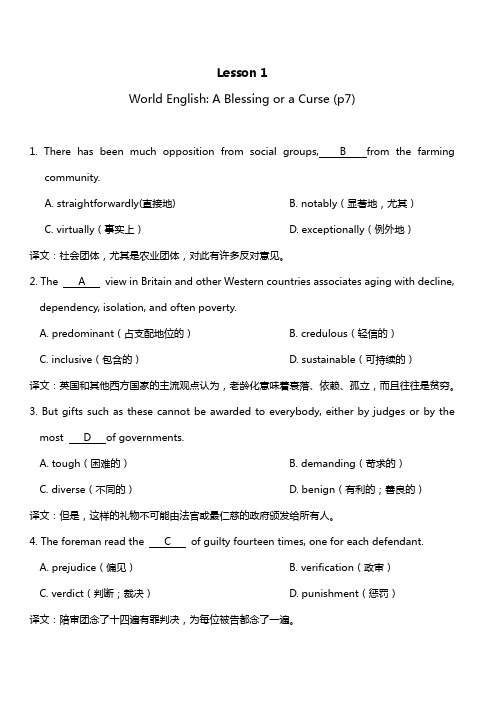
Lesson 1World English: A Blessing or a Curse (p7)1. There has been much opposition from social groups, B from the farmingcommunity.A. straightforwardly(直接地)B. notably(显著地,尤其)C. virtually(事实上)D. exceptionally(例外地)译文:社会团体,尤其是农业团体,对此有许多反对意见。
2. The A view in Britain and other Western countries associates aging with decline, dependency, isolation, and often poverty.A. predominant(占支配地位的)B. credulous(轻信的)C. inclusive(包含的)D. sustainable(可持续的)译文:英国和其他西方国家的主流观点认为,老龄化意味着衰落、依赖、孤立,而且往往是贫穷。
3. But gifts such as these cannot be awarded to everybody, either by judges or by the most D of governments.A. tough(困难的)B. demanding(苛求的)C. diverse(不同的)D. benign(有利的;善良的)译文:但是,这样的礼物不可能由法官或最仁慈的政府颁发给所有人。
4. The foreman read the C of guilty fourteen times, one for each defendant.A. prejudice(偏见)B. verification(政审)C. verdict(判断;裁决)D. punishment(惩罚)译文:陪审团念了十四遍有罪判决,为每位被告都念了一遍。
研究生英语阅读教程翻译及课后练习答案U9_Text A1

Financial crisis leads to the rethinking of careers.
A new map of talent flow is presented.
Text Study
Audio
Para. 1
1 In the Depression, smart college students flocked into civil engineering to design the highway, bቤተ መጻሕፍቲ ባይዱidge and dam-building projects of those days. In the Sputnik era, students poured into the sciences as America bet on technology to combat the cold war Communist challenge. Yes, the jobs beckoned and the pay was good. But those careers, in their day, had other perks: respect and self-esteem.
keep/leave your options open avoid making a decision now so that one still has a choice later 暂不作决定; 留有选择余地: Don’t take the job now. Keep your options open until you leave university. 先别接受这份工作--暂 时保留选择权, 到离开这所大学再说.
Reading—Text A
Main Idea & Structure Text Study
研究生英语阅读教程(基础级3版)课文答案翻译
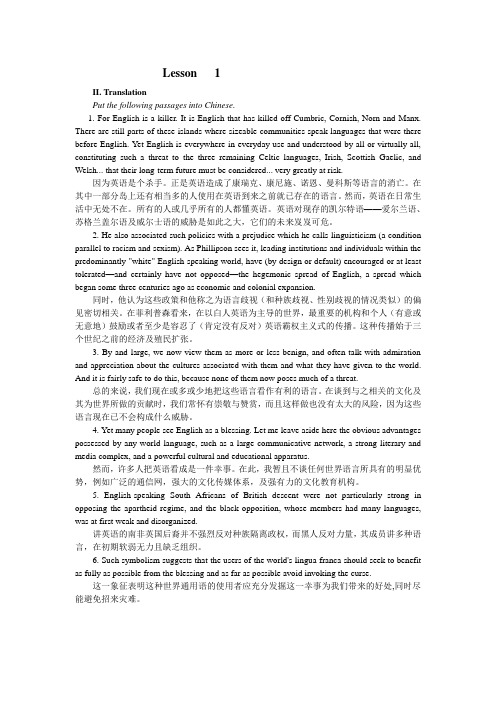
Lesson 1II. TranslationPut the following passages into Chinese.1. For English is a killer. It is English that has killed off Cumbric, Cornish, Norn and Manx. There are still parts of these islands where sizeable communities speak languages that were there before English. Yet English is everywhere in everyday use and understood by all or virtually all, constituting such a threat to the three remaining Celtic languages, Irish, Scottish Gaelic, and Welsh... that their long-term future must be considered... very greatly at risk.因为英语是个杀手。
正是英语造成了康瑞克、康尼施、诺恩、曼科斯等语言的消亡。
在其中一部分岛上还有相当多的人使用在英语到来之前就已存在的语言。
然而,英语在日常生活中无处不在。
所有的人或几乎所有的人都懂英语。
英语对现存的凯尔特语——爱尔兰语、苏格兰盖尔语及威尔士语的威胁是如此之大,它们的未来岌岌可危。
2. He also associated such policies with a prejudice which he calls linguisticism (a condition parallel to racism and sexism). As Phillipson sees it, leading institutions and individuals within the predominantly "white" English-speaking world, have (by design or default) encouraged or at least tolerated—and certainly have not opposed—the hegemonic spread of English, a spread which began some three centuries ago as economic and colonial expansion.同时,他认为这些政策和他称之为语言歧视(和种族歧视、性别歧视的情况类似)的偏见密切相关。
- 1、下载文档前请自行甄别文档内容的完整性,平台不提供额外的编辑、内容补充、找答案等附加服务。
- 2、"仅部分预览"的文档,不可在线预览部分如存在完整性等问题,可反馈申请退款(可完整预览的文档不适用该条件!)。
- 3、如文档侵犯您的权益,请联系客服反馈,我们会尽快为您处理(人工客服工作时间:9:00-18:30)。
How We Broke the Murdoc Scandal
1.现在,人人都知道默多克的故事是如何结束的:其雇员的所作所为引起人们强烈的反感,
议会的投票结果令一个价值数十亿美元的并购行动戛然而止。
这个投票结果是迄今为止人们所知最一边倒的。
2.新闻投诉委员会及时公布了自己的调查结果:没有证据表明,“害群之马”的理论不属实。
在那个时候,就连国际新闻公司也不再坚持自己的论调,但是监管部门却像个小狗一样满地打滚来讨好他们。
3.该委员会的一两位成员曾经说,他们感觉受到了恐吓,因为有人扬言,如果他们坚持这么
做,国际新闻公司的记者就可能会对他们做些什么。
因此,他们就没有坚持下去。
4.2009 年11月就业法庭认定《世界新闻报》一位前记者在库尔森手下遭受了欺凌之后判给
他超过100万美元的赔偿。
当时我就知道我们所选择的道路将会是多么的孤独。
5.如果舰队街的大多数同仁准备视而不见,我想我最好在别处试试,别让这故事胎死腹中,
现在只有尼克还在孜孜不倦地为我们自己的报纸提供更多的故事。
A Beautiful Mind
1.小约翰·福布斯·纳什——数学天才、理性行为理论的缔造者、预见思想机器出现的预
言家——已经和来访者,也是一位数学家,共坐了将近半个小时。
2.他一直目光呆滞地盯着哈佛教授乔治·麦基左脚前方不远的地方,除了一次次重复着将垂
在前额的略长的黑发拨开的动作,他几乎一动不动。
3.在未来十年,在那既以对人类理性抱有无上信念而著称,又以对人类生存怀有无尽忧虑而
闻名的十年,纳什,用知名几何学家米克哈尔·格罗莫夫的话说,证明了自己是“20世纪后半叶最杰出的数学家”。
4.数学家保罗·哈莫斯写道,天才“分为两种:一种就像我们大家一样,只是更为出色;
另一种则是那些明显具备超凡人类灵感的人。
我们都能跑步,有些人还能在四分钟内跑完一英里;但是我们大多数人所做的一切无论如何也无法与创作出G小调赋格曲相提并论”。
纳什的天分就属于那种常与音乐和艺术而非与最古老的科学紧密相连的神奇异禀。
5.他具有一种难以抑制的理性,希望将生活中的决定——是搭乘第一部电梯还是等待下一
部,到哪里存钱,接受什么样的工作,是否结婚——都转化为利弊得失的计算,转化为完全脱离感情、习俗和传统的算法法则或数学规则。
6.他一贯冷漠,但一时兴起也会喋喋不休地谈论外太空和地缘政治趋势,或做出孩子般的恶
作剧,或者毫无征兆地勃然大怒。
这些情感的迸发总是和他的沉默一样神秘莫测。
“他和我们不一样”是人们常说的一句话。
7.纳什对于人类竞争动态变化的洞察——他的理性竞争与合作理论——将会成为20世纪最
具影响的思想理论之一。
这一理论改变着新兴的经济学,其作用无异于孟德尔的基因遗传、达尔文的自然选择模式和牛顿的天体力学再造了当时的生物学和物理学。
A Chritmas Sermon on Pace
1.今年圣诞时节,人们困惑惶恐,内心无法宁静,外部没有和平。
无论身置何处,恐慌昼夜
萦绕于胸。
我们这个世界已厌倦了战争,无论何处都危机四伏。
各位教友, 即便如此, 我们不能把祈求和平、善待众人的基督圣训视作不切实际的虔诚美梦。
2.如果不能友善待人, 我们所有和所能必将由于使用不当而使我们走向自我毁灭。
历史的经
验告诉我们, 战争早已过时。
曾几何时, 战争或有以毒攻毒之效, 可以遏制邪恶势力的蔓延与发展, 然而正是现代战争利器的巨大破坏力, 使它再不能被视作打击邪恶的正义之举。
3.现在,我首先要说的是,要想世界和平,我们就必须忠于芸芸,而不是忠于一隅。
我们的
忠心必须超越我们的种族和部落,超越我们的阶层和国家;这就意味着我们必须放眼世界。
4.其次,我呼吁,要实现世界和平,所有人、所有国家必须坚守非暴力信念,坚信目的、手
段必须互渗互连。
手段与目的的关系一直是历史上颇有争议的重大哲学问题之一。
总有人认为只要目的正确,可以不择手段, 重要的是要达到目的。
5.再则, 我要说,若想世界和平、世人和睦,必须以非暴力申明所有人的生命都是神圣的。
每个人都很重要,因为他们都是上帝之子,因此,我们说“勿杀生”,是指人的生命是神圣的,不应在战场上被轻易夺走。
人的生命远非旋转电子构成的奇妙之物, 也不是无尽燃烧的焖火中升起的一缕轻烟。
Spell of the Rising Moon
1.但无论怎样,月亮依旧牵动我们的心灵。
倘若我们偶尔遇见一轮黄灿灿的满月高悬中天,
谁都会禁不住停下来凝神仰望她尊贵的姿容。
而月亮也向注视她的人赐予厚礼。
2.然而当月亮缓缓升起,离开山头,它变得坚定、威严;它的面孔也由红变成了橘红,又变
成金色,最后是平静的明黄色。
它似乎从渐暗的大地中吸取了光明,因为随着它的升起,下面的丘陵山谷愈来愈黯淡朦胧。
待到皓月当空,满月如盘,闪烁着象牙般乳白的清辉,山谷便成了风景中一片片幽深的阴影。
3.月出是缓慢的,充满神奇。
观看月出,我们得回到过去那种对时间的耐心中去。
观看月亮
不可阻挡地升到空中就能让我们内心安宁。
我们的神思能让我们看到宇宙的广漠和大地的宽阔,能让我们忘掉自己。
我们觉得自身渺小,却又深感大自然的厚待。
4.月色下,我们看不到生活中坚硬的棱角。
山坡在月光下如同笼上了柔和的轻纱,一片银白;
海水在月光下碧蓝而静谧;我们在月光下也不再像白日那般精于算计,而是沉醉于自然的情感中。
5.后来我常回到山上观月,尤其是在接踵而来的事使我身心疲惫、头晕眼花时。
6.恋人和诗人在夜里能找到生活更深刻的意义。
其实我们都爱问一些深刻的问题——我们的
祖先是什么?我们的命运在哪里?我们不喜欢那些统治着白天世界的刻板的几何教科书,都愿意沉溺于永远找不到答案的谜团中。
在夜里,我们都成了哲人和神秘主义者。
7.月出之时,当我们放慢自己的思想,让它跟随天国的脚步,一种心醉神迷的感觉就会流遍
全身。
我们会打开情感的窗口,会让白天被理智锁住的那部分思绪尽情奔涌。
我们越过遥
远的时空,听见远古猎人的低语,再次看到很久以前的恋人与诗人眼中的世界。
Mind over Machine
1.再看看那些电缆。
电缆弯弯曲曲地进入计算机后盖,然后又出来,最后到达猕猴头上的帽
子里。
电缆从埋在猕猴大脑里的数百个电极接收信号,猕猴用思维向机器手臂发出指令。
2.几十年来,科学家就一直在思索、推测大脑和机器直接联系的可能性,但都认为这不切实
际。
只是到了20 世纪90 年代末,科学家才开始充分地了解大脑与信号处理的有关知识,从而出现了使科幻小说的幻象变成现实的希望的曙光。
3.解码大脑指令的想法乍看起来可能像是十足的狂妄自大。
计算机怎么能窃听日常生
4.活每时每刻发生在大脑里的全部活动呢?
5.但是,大多数研究人员认为,每种类型的运动都是靠大脑几十亿神经元中一些少数特定的
神经元来控制的——为了找到那些少数神经元而需要监测整个大脑则会使成功的解码变为实际办不到的事。
6.因此,那时知道的一切表明,脑-机联系是徒劳无益之举。
结果证明,那一切都是错误的。
A Summer’s Reading
1.乔治无所事事,曾经打算去上暑期学校,但年龄会比班上的同学大太多。
他还考虑过报名
参加高中夜校,只不过他不喜欢老师对他指手画脚。
他觉得他们根本不尊重他。
2.他坐在那里的一张凳子上,看着茂密的树木和栏杆里盛开的花朵,为自己设想着未来更加
幸福的生活。
他想起退学以来所干过的工作——投递员、库房保管员、信使、后来在工厂的活儿——没有一样他满意的。
他觉得他有一天会有一份好工作,住在林荫大道边有前廊的私宅里。
3.偶尔卡坦扎拉先生会喝得醉醺醺地回家,但他并不嚷嚷。
他从不惹事儿,只是僵直地在街
上走着,慢慢地爬上楼梯进入大厅。
虽然醉了,他看上去和平时没什么两样,只不过走路僵硬,默不作声,两眼潮湿。
4.他晚上仍然散步到小公园里。
但一天晚上隔壁街区的鞋匠叫住乔治,说他是个好孩子。
他
估摸卡坦扎拉先生告诉过他关于自己读书的事。
从鞋匠的嘴里这件事情肯定传遍了整条街,因为乔治看见一些人友善地向他微笑,虽然没有人单独和他说过话。
他对这个街区的感觉好了一些,不过还没有到希望永远在这里生活下去的地步。
5.他用这些钱买了他喜欢享受的东西——大部分是香烟,偶尔是啤酒或者电影票。
假如懂得
如何享受,生活还不算太坏。
偶尔他也从报刊亭买一本平装书,但总是腾不出时间来读,虽然他很高兴自己屋子里有一两本书。
6.一天晚上,他再也无法忍受酷热,后半夜一点钟冲到大街上,像个幽灵一般。
他希望偷偷
溜进公园,不被人看见,但整个街区都是人,没精打采地等待着凉风到来。
